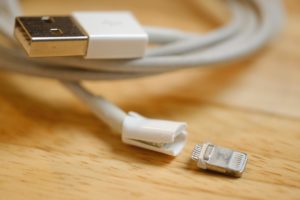
Lithium batteries power many of our electronics including smartphones, tablets, laptops, toys and even cars. These batteries store a large amount of energy in a densely compact space. In rare circumstances, they can be defective and become a fire hazard.
Here are a few safety tips:
Storage
- Store batteries away from anything that can catch fire.
- If possible, remove batteries from the device for long-term storage.
- Keep batteries at room temperature and in dry spaces. Avoid placing them in direct sunlight, near heaters or in hot vehicles as exposure to a hot environment can cause thermal runaway and catch fire.
- For long-term storage, place electrical tape over the battery contacts and store them in a metal container.
Charging

- Only use the charging adapter and cord that came with the device. Other charging equipment may create excessive heat and overcharging that can catch fire or explode.
- Stop using damaged adapters or cords. Replace them with ones recommended by the device’s manufacturer.
- Do not charge a device under your pillow, on your bed, or on a couch.
- Recharge batteries in long-term storage at least once every six months.
Signs of a Problem

- Damaged, punctured, overcharged and overheated lithium batteries can get hot enough to catch fire.
- Inspect batteries and devices at least once a week to check for deformities, unusual odors, leaking or excessive heat.
- Disconnect charging batteries or devices immediately if they display any of these signs and move them away from other combustible materials.
- If the battery or device catches fire, move everyone to a safe place then call 9-1-1.
Disposal
- Do not discard lithium batteries or devices that contain them in the trash. Remember, this is a fire hazard.
- Dispose of lithium batteries and devices at Seattle Public Utilities’ Household Hazardous Waste Facilities or at King County’s Household Hazardous Waste Collection options.